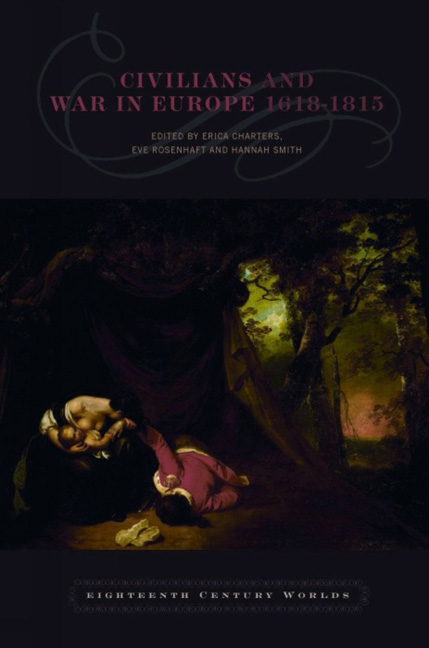Book contents
- Frontmatter
- Contents
- List of Contributors
- Acknowledgements
- List of Illustrations
- List of Abbreviations
- 1 Introduction
- Part I Suffering, Reconciliation and Values in the Seventeenth Century
- 2 Was the Thirty Years War a ‘Total War’?
- 3 Grotius and the Civilian
- 4 War, Property and the Bonds of Society: England's ‘Unnatural’ Civil Wars
- 5 Transitional Justice Theory and Reconciling Civil War Division in English Society, circa 1660–1670
- Part II The State, Soldiers and Civilians
- Part III Who is a Civilian? Who is a Soldier?
- Part IV Contradictions of the French Revolutionary and Napoleonic Wars
- Bibliography
- Index
4 - War, Property and the Bonds of Society: England's ‘Unnatural’ Civil Wars
from Part I - Suffering, Reconciliation and Values in the Seventeenth Century
- Frontmatter
- Contents
- List of Contributors
- Acknowledgements
- List of Illustrations
- List of Abbreviations
- 1 Introduction
- Part I Suffering, Reconciliation and Values in the Seventeenth Century
- 2 Was the Thirty Years War a ‘Total War’?
- 3 Grotius and the Civilian
- 4 War, Property and the Bonds of Society: England's ‘Unnatural’ Civil Wars
- 5 Transitional Justice Theory and Reconciling Civil War Division in English Society, circa 1660–1670
- Part II The State, Soldiers and Civilians
- Part III Who is a Civilian? Who is a Soldier?
- Part IV Contradictions of the French Revolutionary and Napoleonic Wars
- Bibliography
- Index
Summary
God allowed Israel to take what they did win in their iust wars; therefore they […] took the Midianites Prisoners, carried away infinite spoyle, & burnt their towns and Cities with fire. David spoyled the Nations which he subdued. It is accounted by the law of Nations a lawfull purchase and the practice of all people in time of warre. For nothing is proper by nature, but either by ancient possession of seis[in], or victory.
SO WROTE Richard Bernard, a fierily Protestant preacher, in 1628, at a time when English men and women were familiar with the battles that ravaged continental Europe. After England's brief and undistinguished interventions in continental wars in the 1620s, however, the English enjoyed a decade of peace, but they followed the course of the Thirty Years War and were shocked by its vividly reported horrors. They congratulated themselves on England's halcyon days even as many Englishmen fought abroad and, at home, knowledge of the laws and conditions of war was widespread. That knowledge was of many kinds – Bernard, for example, linked his biblical examples to the law of nations as recognised in his own day – but until 1639 its application remained comfortably distant from everyday English life. The multiple domestic tensions of the 1630s – religious, constitutional, financial and social – were contained, if with increasing strain, until war and its associated costs and taxation forced a crisis.
In 1639 and again in 1640 England found itself at war with its sister kingdom of Scotland, and suffered humiliating defeat. In 1641 rebellion erupted in Ireland and was reported in England in terms reminiscent of the worst atrocities of the Thirty Years War. These crises and their ensuing financial demands forced the calling of parliaments to authorise taxation, and at the same time fostered fierce public concern, popular demonstrations and a thirst for scapegoats, whether Irish Catholics, the king's advisor the Earl of Strafford, or the purportedly crypto-Catholic Archbishop Laud. By the summer of 1642 the breach between King Charles I and his increasingly combative parliament could not be healed and their respective armies faced each other in the field. Unlike the conflicts with the Scots and the Irish, this was a war between Englishmen. It lasted until, in the summer of 1646, parliament was decisively victorious; it was briefly renewed in 1648, and evolved into a new war with Scotland in 1650–51.
- Type
- Chapter
- Information
- Civilians and War in Europe 1618–1815 , pp. 52 - 67Publisher: Liverpool University PressPrint publication year: 2012



